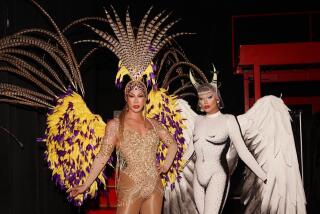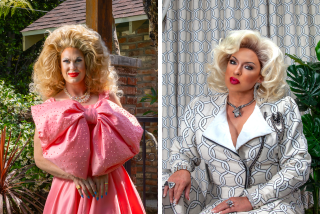A Continental Divide : German Dressage Teacher, Champion Shares His Talents With Riders at the Flintridge Club
- Share via
“Cracking fit.”
Gerhard Politz offers the keenly British phrase, along with a bright and broad grin, when he explains the optimal state of well-conditioned dressage horses.
Politz, a 47-year old German emigrant, is a Grand Prix champion rider and British Horse Society Instructor who, for the past 18 months, has been teaching at the Flintridge Riding Club.
And cracking fit is an accurate description of the tanned, blue-eyed Politz, who at 6-foot-3 cuts an impressive figure both astride the muscular horses and in the saddle atop them.
“If you ever saw a horse in its natural state, it has virtually no muscle,” Politz says. “Dressage turns a nondescript horse into an athlete.
“And I enjoy helping athletes reach their potential.”
Unlike jumping, which can be spectacular to watch, dressage is to be appreciated for its exacting subtleties.
In competition, horse and rider are judged on more than 30 standard movements--from how straight the horse runs while entering a competition ring to how immobile a horse is while a rider salutes the judges.
“It’s not particularly spectator-appealing unless you are somewhat of an expert in the field and you know what you’re looking at,” Politz said. “It’s not like jumping, where you go over a fence and the pole either stays up or falls down.”
Dressage, however, is gaining in popularity thanks to the efforts of people such as Politz, who owned a boarding and training stable in Germany for 15 years and has given clinics throughout the United States for 10 years.
Two weeks ago, Flintridge was the site of the first West Coast dressage competition since the 1984 Olympics to be sanctioned by Federation Equestre International.
Politz, who lives in Glendale, was one of 50 riders that competed in an event Politz hopes will spur an official international show at the stables next year.
“People are realizing the more you know about it, the more you feel that there is still much to learn,” Politz said. “It gets more complex the more you know. I think that has a certain stimulus to many people.
“It’s not just ‘Giddyap, let’s go.’ You do that every once in a while to have fun but there comes a point when dressage isn’t just a sport, but could also be an art.”
For Politz, the facilities at Flintridge are a perfect canvas for creating champions.
The club, which borders the Jet Propulsion Laboratory, covers 40 acres and is equipped with two full-size (60 X 20 meters) international rings.
The tree-lined grounds feature expanses of countryside, which were particularly appealing to Politz.
“There’s terrific potential here,” Politz said. “I can make use of all these wonderful things that really get the horse’s hind end motivated in a very natural way.”
Patrolling the grounds by foot, horse or pick-up truck, Politz teaches lessons and offers advice to riders on everything from proper posture to preventive maintenance for boot zippers.
Politz learned his earliest lessons about horses from his grandfather, a German cavalryman during World War I who retired to a small farm in Westphalia, formerly a province of Prussia.
“My first experiences were nothing really formal,” Politz recalled. “I got plunked down on the horse and just got led around, but it stimulated my interest.”
At age 13, Politz began formal riding training while attending prep school in England. He practiced several disciplines, including hunting, eventing and dressage, and continued to develop his skills following graduation.
Politz was 25, in the process of establishing a German company that manufactured appliances, when he chose to pursue horsemanship, rather than commerce, full time.
“I just decided I would rather do something that was maybe questionable from a financial success standpoint, but would ensure that I enjoy what I’m doing,” Politz said.
In England, Politz went through the rigorous training required of English and European instructors.
The regimen includes a three-year apprenticeship, class study, and two or three years at the assistant instructor level before final exams.
Licensed by the German National Federation as a professional teacher and trainer, Politz opened his stable near Stuttgart, boarding and training as many as 70 horses at a time.
Requests from clients and friends in the United States, along with climate, ultimately drew Politz to Flintridge.
Now that he is here, Politz said he would like to help establish a training system for instructors. Unlike England and Europe, the United States has no licensing organization.
“People are recognizing that the training provides you with a strong background,” Politz said. “People like myself are sought after because of the formal training.
“There are a lot of very, very knowledgeable self-taught people in this country, but there aren’t enough of them.”
More to Read
Go beyond the scoreboard
Get the latest on L.A.'s teams in the daily Sports Report newsletter.
You may occasionally receive promotional content from the Los Angeles Times.











